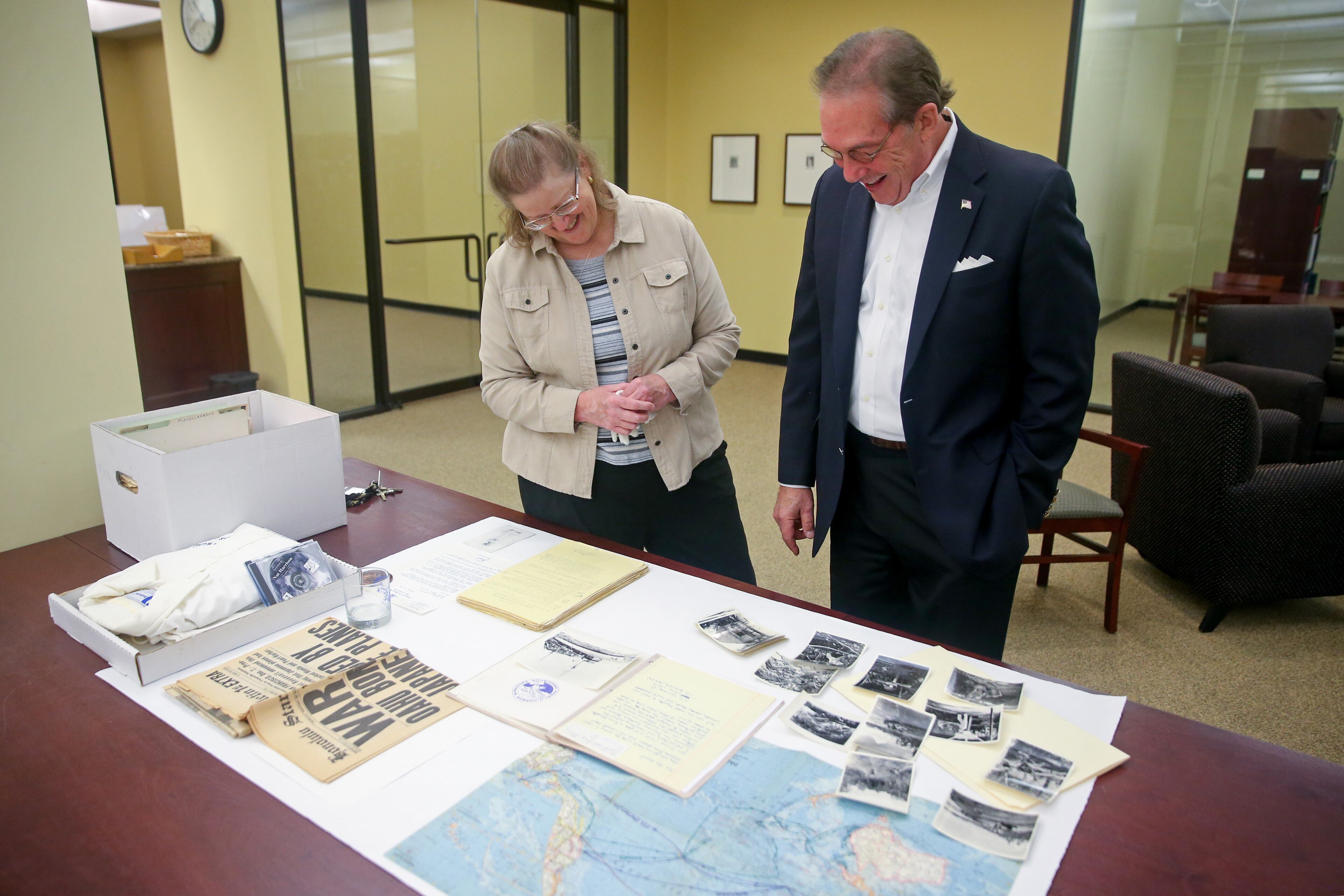Survivor tells of Pearl Harbor in legacy to son, and now to Atlanta
In 2001, Nathaniel Harrison III was helping pack up his mother’s home when he came across a suitcase under his dad’s bed. In it were relics his late father kept from the attack on Pearl Harbor.
Lt. Cmdr. Nathaniel “Nat” Harrison Jr. was serving on the USS Sumner during the attack on Dec. 7, 1941.
“I had no idea what was in it,” the younger Harrison, who goes by Cole, said about the satchel under the bed. “Then, when I was packing up his stereo, mother said: ‘Well, what are you going to do with all those cassettes?’ ”

His discovery unearthed hours of audio about the attack that brought the United States into World War II, daily ship logs from the USS Sumner, and pictures taken on missions and in villages across the South Pacific. The collection was donated last week to the Atlanta History Center, and approved Tuesday by a committee of curators and archivists.
A Navy vet himself, having served during Vietnam, Cole Harrison said he was fascinated by what he learned of his father’s naval career from the tapes and other paraphernalia. Nat Harrison died in 1997.
Personal stories and private collections play a large part in retelling history, said Sue VerHoef, the director of oral history and genealogy at the Atlanta History Center.
“We depend heavily on people bringing things in,” she said. “We’re always grateful.”
The lure of the senior Harrison’s collection is the completeness of what’s included. On one of the cassettes, Nat Harrison relayed a story on Dec. 6 about a seaman named Clifton who came to the ship while Harrison was on duty, hoping to relay a message he’d received from a Japanese family he befriended.
“They have warned me we ought not to be in Pearl Harbor on Sunday morning,” Clifton told Harrison.
“I said ‘What’s the problem? You been drinking Saki again?’” Harrison said.
“No sir. I don’t drink Saki and I don’t smoke.”
Nobody believed him.
“How could this young boy, a seaman 2nd, know anything that all of our communications didn’t know, to come back aboard and say we were in trouble? “ Nat Harrison said. “Nobody would believe us.”
Among the mementos and documents are pictures of debris from battle along beaches, children in villages, dead bodies and daily ship logs from the USS Sumner, which stop on Dec. 6 and pick back up about a week later.

“For obvious reasons,” VerHoef said.
Once the materials are processed, they will be made available for public viewing.
The Atlanta History Center’s program offerings include tours and traveling trunks of historical relics. Tuesday, a group of students were taking a tour that showcased the Trail of Tears, when Cherokee Indians were forced to give up land east of the Mississippi River in 1838 and 1839, eventually resettling in what is now Oklahoma. The Atlanta Historical Society was founded in 1926 to tell the city’s story and its impact on society at large. The main museum building opened just over 20 years ago.
While doing research on Nat Harrison, VerHoef said she also found a draft registration card from World War I for his father, Nathaniel Harrison Sr.
“Having his voice is just remarkable,” she said about the audio recordings from Nat Harrison.

In one recording, Harrison tells of hearing the ship alarm on December 7, thinking it was a fire drill. He put on a red housecoat, strapped a .45 pistol outside it and emerged on the deck in that outfit to find Japanese planes attacking.
“Kids don’t remember two paragraphs from a textbook, but they’ll remember that bright red Japanese housecoat that he walked up on deck with,” VerHoef said. “We’re lucky to have photographs, ships logs and so many other things.”
When he realized what he had in 2001, Cole Harrison said he spent time putting the hours of recordings on CDs for his siblings, children, nieces and nephews. Three years ago, he decided to donate the collection to the Atlanta History Center, but wanted to go over everything with his siblings to decide what they would part with. The time capsule compiled by Nat Harrison also included information and recordings about his time with the Pearl Harbor Survivors Association, as well as the 44 years he worked for Coca Cola, a job he began after leaving the Navy.
“It was amazing how much detail dad remembered from then,” Harrison said. “He even remembered the nicknames of the men on his ship. I’m lucky if I remember a name or two of the guys I served with.”



